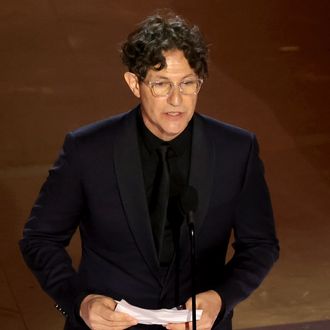
In the weeks since Jonathan Glazer’s acceptance speech at this year’s Oscars ignited a blistering political firestorm, swarms of voices have either condemned or supported his carefully delivered words that subtly referenced Israel’s ongoing war in Gaza. As pro-Palestine protests raged outside the ceremony on March 10, Jonathan Glazer, shaking with conviction, brought his own antiwar sentiments to the 96th Academy Awards, taking his action to the stage with the Best International Feature Film win for his stark Holocaust drama, The Zone of Interest. In his acceptance speech, the director wondered how we can resist “dehumanization,” saying the Academy Award–winning historical drama is just as much a look at “what we do now.” It was the only onstage acknowledgment of what’s happening in Palestine, as most celebrities opted to wear a red pin and let that speak for itself.
Glazer’s words were met with swift criticism from conservative pundits, condemnation from Jewish groups like the Holocaust Survivors Foundation, and an open letter signed by Jewish artists denouncing the speech. They were provoked by one specific element of the speech, which said, “Right now we stand here as men who refute their Jewishness and the Holocaust being hijacked by an occupation, which has led to conflict for so many innocent people.” The Zone of Interest director found support with other industry figures. On April 5, a separate group of Jewish creatives signed an open letter, writing how “alarmed” they were to see industry peers “mischaracterize and denounce his remarks.” Below, Glazer’s full speech and the backlash that followed. Jump to the latest reactions here.
Read the full transcript of Glazer’s speech:
Thank you so much. I’m gonna read. Thank you to the Academy for this honor and to our partners A24, Film4, Access, and Polish Film Institute; to the Auschwitz-Birkenau State Museum for their trust and guidance; to my producers, actors, collaborators. All our choices were made to reflect and confront us in the present — not to say, “Look what they did then,” rather, “Look what we do now.” Our film shows where dehumanization leads, at its worst. It shaped all of our past and present. Right now we stand here as men who refute their Jewishness and the Holocaust being hijacked by an occupation, which has led to conflict for so many innocent people. Whether the victims of October the — [Applause.] Whether the victims of October the 7th in Israel or the ongoing attack on Gaza, all the victims of this dehumanization, how do we resist? [Applause.] Aleksandra Bystroń-Kołodziejczyk, the girl who glows in the film, as she did in life, chose to. I dedicate this to her memory and her resistance. Thank you.
Why was Glazer misquoted?
Shortly after the speech, Glazer was misquoted online, including by Variety, which later corrected a story. It originally wrote that Glazer said, “Right now, we stand here as men who refute their Jewishness.” The full quote is, “Right now we stand here as men who refute their Jewishness and the Holocaust being hijacked by an occupation, which has led to conflict for so many innocent people.”
Other misunderstandings and false claims about Glazer were shared online. Conservative Ben Shapiro wrote on Twitter that “In Jonathan Glazer’s Zone of Interest, you don’t see one Jew. Those are the best Jews, according to Glazer: the faceless victims screaming in the distance. Ironically, he’s the villain: picking up awards from the bodies of those anonymous dead Jews while ignoring the living ones getting slaughtered in the Gaza Envelope by genocidal murderers.” There are, in fact, Jewish characters in the film, though The Zone of Interest does intentionally focus how non-Jewish Germans emotionally distanced themselves from the horrors they were committing.
Multiple groups released open letters denouncing Glazer’s speech
On Monday, March 18, over 450 creatives in the entertainment industry, including Debra Messing, Jennifer Jason Leigh, Amy Pascal, Amy Sherman-Palladino, Eli Roth, Sherry Lansing, Joel Fields, and Joe Weisberg, signed a letter denouncing Glazer’s speech, according to Variety. Their group statement reads: “We refute our Jewishness being hijacked for the purpose of drawing a moral equivalence between a Nazi regime that sought to exterminate a race of people, and an Israeli nation that seeks to avert its own extermination.” Glazer has not responded to the letter.
Richard Trank, producer of the Oscar-winning Holocaust documentary The Long Way Home, wrote a guest column in The Hollywood Reporter, published on March 13. “One thing I do know is that many Jews around the world were outraged and disgusted by what the Oscar winner had to say at this year’s Academy Awards,” he wrote. “And joining that group, I would say that if we are going to resist or refute anything, it’s statements like the one issued by Jonathan Glazer.”
In response to Glazer’s speech, the Holocaust Survivors Foundation president David Schaecter said in an open letter, dated March 11, “You made a Holocaust movie and won an Oscar. And you are Jewish. Good for you. But it is disgraceful for you to presume to speak for the six million Jews, including one and a half million children, who were murdered solely because of their Jewish identity.” He went on: “If the creation, existence, and survival of the State of Israel as a Jewish state equates to ‘occupation’ in your mind, then you obviously learned nothing from your movie.”
Has anyone from the film commented?
None of the stars of The Zone of Interest have commented yet. A spokesperson for Len Blavatnik, one of the producers on the film, who was onstage during the acceptance speech and is a staunch supporter for Israel, told Variety that “Mr. Blavatnik is extremely proud of The Zone of Interest and the acclaim it has received. His long-standing support of Israel is unwavering.”
Has Glazer made a statement since the speech?
Jonathan Glazer hasn’t spoken publicly since winning the award, including skipping the backstage pressroom after his speech.
Jewish creatives support Glazer’s speech
Joaquin Phoenix, Elliott Gould, and Chloe Fineman were among the 151 Jewish artists to sign an open letter in support of Glazer’s Oscars speech on April 5. “We were alarmed to see some of our colleagues in the industry mischaracterize and denounce his remarks,” the letter read. “Their attacks on Glazer are a dangerous distraction from Israel’s escalating military campaign, which has already killed over 32,000 Palestinians in Gaza and brought hundreds of thousands to the brink of starvation. We grieve for all those who have been killed in Palestine and Israel over too many decades, including the 1,200 Israelis killed in the October 7 Hamas attacks and the 253 hostages taken.”
The letter emphasized how the fierce rebuke of Glazer could negatively impact the industry: “The attacks on Glazer also have a silencing effect on our industry, contributing to a broader climate of suppression of free speech and dissent, the very qualities our field should cherish. Glazer, Tony Kushner, Steven Spielberg, and countless other artists of all backgrounds have decried the killing of Palestinian civilians. We should all be able to do the same without being wrongly accused of fueling antisemitism.” Other notable signatories include Lenny Abrahamson, Annie Baker, Kate Berlant, Janicza Bravo, Joel Cohen, Ilana Glazer, Todd Haynes, Hari Nef, and Boots Riley.
Kirsten Dunst and Angels in America playwright Tony Kushner were among those who previously came out in support of Glazer. “My interpretation was he was saying that genocide is bad,” Dunst said in a Variety interview on April 3. Kushner felt similarly. “What [Glazer’s] saying is so, is so simple,” he said in Deadline on March 20. “He’s saying Jewishness, Jewish identity, Jewish history, the history of the Holocaust, the history of Jewish suffering must not be used in a campaign as an excuse for a project of dehumanizing or slaughtering other people. This is a misappropriation of what it means to be a Jew, what the Holocaust meant, and he rejects that.” He added, “Who doesn’t agree with that? What kind of person thinks that what’s going on now in Gaza is acceptable?”
This story has been updated with additional information.





